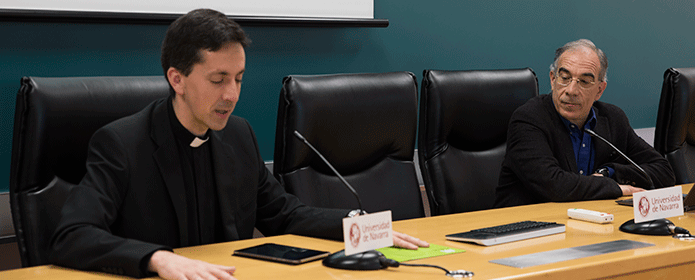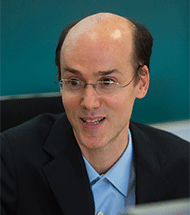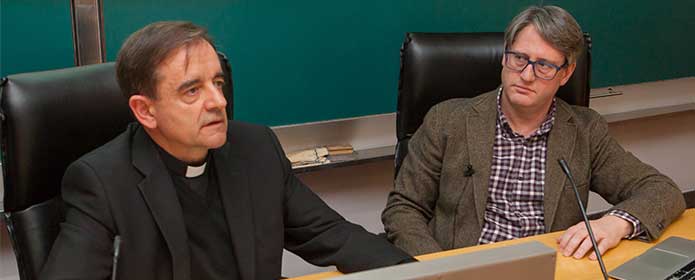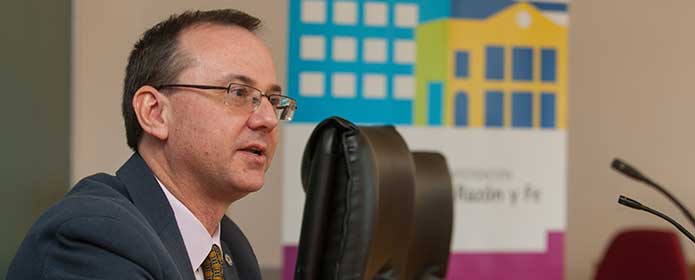"Climate change is not being addressed because we have reached a political, social and economic level that requires courageous decisions.
Emilio Chuvieco, Full Professor of Geography of the University of Alcalá, gives the seminar of the group 'Science, Reason and Faith' of the University of Navarra.

Emilio Chuvieco, Full Professor of Geography at the University of Alcalá, has given the seminar of the group 'Science, Reason and Faith' of the University of Navarra. Under the degree scroll "Climate change: what do we know and how do we respond?", in his session he pointed out some considerations on a topic that, in his opinion "is very hot in the scientific world, in the media and in politics".
As he stated, since the industrial revolution, the temperature average of the planet has risen approximately 1ºC above previous temperatures: "Since 1880, the ten hottest years have occurred from 1998 to the present and the hottest years have taken place in the last three years". An issue that is producing visible changes. "After observing the ice, a clear downward trend was sample : we are losing about 90,000 square kilometers per year in surface area. There has also been an increase in water levels and, according to programs of study of the University of Louvain, in the last decade there has been a fivefold increase in climate-related disasters," he said. The expert also pointed out that the International Monetary Fund has also made "an estimate of the proportion of GDP that countries would gain or lose, depending on compliance with climate change trends, which is Degree on the current status : as a result of the impact, most poor countries would be much poorer".
Faced with this panorama, and the increase in CO2 emissions -we emit between 38,000 and 45,000 million tons per year-, Full Professor proposes a series of measures such as "planting more trees, avoiding industrial CO2 emissions as much as possible and changing our energy model towards sources of leave emissions, without forgetting to be more efficient -with measures that are not excessively spartan, we could save up to 20% of the energy we consume-". However, he says that we do not act "because there is some resistance to change, and we have reached a political, social, economic and staff level that requires decisions of great courage". A status that requires "new motivations in the fields of literature, cinema, ethics, Philosophy and religion". Regarding the latter, he argued that religions could be a great moral inspiration source : "Benedict XVI alluded to an effective change of mentality, leading us to adopt new lifestyles, where consumer choices are based on the search for truth, beauty and goodness. Pope Francis, who also spoke about this topic in Laudato Si, underlines the importance of the choices we make: What we do is not trivial, we can be part of the solution or part of the problem".
For this reason, and to conclude, Chuvieco encouraged the attendees to "rethink our relationship with nature and see how we use the planet's resources, reducing consumption or making it more manager, contributing to reforesting degraded spaces. We all have responsibilities and we should have more effective commitments in this sense".
Emilio Chuvieco is Full Professor of Geography at the University of Alcalá and director of the Chair of Environmental Ethics. Director of the Master's Degree in Geographic Information Technologies, has been researcher visitor at universities such as Berkeley, Cambridge or the Canadian Center for Remote Sensing, among others. He has also participated in numerous research projects, is a corresponding member of the Academy of Sciences and co-publisher editor of the journal Remote Sensing of Environment. Much of his professional activity has been devoted to environmental applications of earth observation satellites, especially in the field of forest fires. In addition, he has a special interest in the relationship between faith and science, in questions of environmental ethics and in how major religions affect nature conservation.



